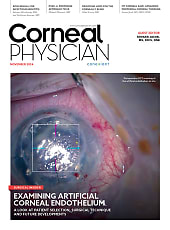EyePoint Pharmaceuticals recently announced results from new subgroup analyses from the phase 2 DAVIO 2 clinical trial of EYP-1901, an investigational sustained-delivery maintenance treatment for wet age-related macular degeneration (wet AMD) combining vorolanib, a selective tyrosine kinase inhibitor, with bioerodible Durasert E.
The DAVIO 2 trial met its primary endpoint, with both EYP-1901 doses (2 mg and 3 mg) demonstrating statistical noninferiority change in best-corrected visual acuity (BCVA) compared to an aflibercept control, as well as a favorable safety profile with no EYP-1901–related ocular or systemic serious adverse events (SAEs). The trial also achieved key secondary endpoints with both EYP-1901 doses, including an approximately 85% mean reduction in historical treatment burden, nearly two-thirds of eyes supplement-free up to 6 months, and over 83% receiving 0 or 1 supplement up to 6 months. Additionally, there was strong anatomical control in both EYP-1901 cohorts as measured by optical coherence tomography (OCT).
Data presented at the Angiogenesis, Exudation, and Degeneration 2024 Meeting showed that, in the subgroup of patients who were supplement-free up to 6 months, the EYP-1901 groups demonstrated numerical superiority in BCVA change in best-corrected visual acuity along with strong anatomic control compared to the aflibercept control group. “This result confirms that the positive visual and anatomical outcomes from our Phase 2 DAVIO 2 trial were driven by EYP-1901 and not by supplemental injections,” Jay Duker, MD, chief executive officer of EyePoint Pharmaceuticals, explained in a press release.
EyePoint expects to initiate a phase 3 trial of EYP-1901 for treatment of wet AMD later this year. The company also remains on track to report topline data from the phase 2 PAVIA trial of EYP-1901 for treatment of nonproliferative diabetic retinopathy (NPDR) in the second quarter of 2024. NRP








